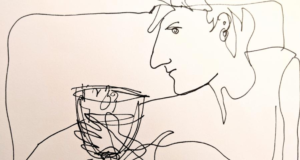Oily Cart’s Flossie Waite tells us about Sensory Theatre
What actually is ‘sensory theatre’?
Take a deep breath.
Feel the weight of your body against your chair.
Close your eyes and tilt your head.
Stretch your body.
Slowly open your eyes.
Looking straight ahead, become aware of the space around you. Build a full picture, taking in what’s in front and on each side of you.
And… relax.
You’ve just used more than five senses. That’s right – as well as sight, sound, touch, taste and smell, we have a sense of balance, a sense of where our body is in space, a sense of movement… In fact, we have as many as 33 senses! They help us perceive and understand the world, support us to move through it, and contribute to our wellbeing.
Theatre traditionally focuses on only sight and sound – so what happens when it expands out to all these other senses?
The start of Sensory Theatre
Oily Cart has been exploring the answer for 40+ years. The company makes shows for and with children and young people, who are gloriously unaccustomed to the ‘shoulds’ of traditional theatre (like sitting still and keeping quiet). Oily Cart’s founders were equally happy to smash up what theatre ‘should’ be. They enjoyed seeing what happens when you follow children’s lead in putting it back together again. What has evolved over the decades is an entirely new, living, breathing, fully feeling type of theatre: Sensory Theatre. And what we’ve learnt is that it can make theatre so much more accessible and inclusive.



What is a sensory show like?
Expanding out to all the senses can lead performances off the stage, and into a hydrotherapy pool. A sensory show might take place on a family’s doorstep, or be sent to them in the post. It might happen in a library or a hospital, a park or a playground.
Each sensory performance considers the entire environment: it is as much about texture, taste, colour, weight, vibration of sound, temperature and touch as it is about words and visuals. It immerses audiences into whole new 360 ° worlds, as their whole selves.
Listening to and learning from audiences leads to constant new discoveries of what a sensory show can be: performing in schools led to the discovery of trampolines as a performance space, for instance. Experimenting with and exploring the possibilities of all the senses leads to innovation: Something in the Air (our show with Ockham’s Razor) flew audiences up into the air to dance alongside aerial artists.
Sensory Theatre is a relatively new field with untapped potential and infinite creative possibilities left to discover. There are endless amounts left to learn from the artists, young people and families we collaborate with. It’s exciting to know that, actually, there is no one way for a sensory show to look or be.
How does Sensory Theatre make theatre more accessible?
Sensory Theatre takes what we all love about going to a show – like sharing a communal experience, the connection between performers and audience, being immersed in a different world – and dials it up.
By using more of your senses, sensory shows don’t just appeal to your brain, but to your whole body. Many of our most powerful and profound experiences happen when we are in our bodies, not our heads. The sensory strips back to what is most human, which is where we all meet.
This approach – treating every sense and way of experiencing the world with equal respect – levels the playing field, giving audiences of different abilities and perspectives equal opportunity to enjoy and contribute. All interpretations and responses to the show are welcome and celebrated, making for a truly communal experience.
With Sensory Theatre, access is at the heart of the creative process. We think about children who experience the most barriers to accessing theatre first, and build out from there, to make something that can potentially work for a much wider group of people. As well as physical, attitudinal, geographical, economic and social barriers to accessing theatre, we deeply consider cognitive access. Not everyone relates to or uses verbal language: creating with all 33 senses makes experiences that are truly beyond words. Working in a sensory way means we can be deeply curious and celebrate different fields of perception and ways of perceiving. For around 50% of our audience, for instance, their field of perception is half a metre from their nose. Rather than a remote end-on performance, we work with two different playing spaces: up close and personal, and the atmospheric global playing space. We shape shows with different processing times in mind, and attune to different communication styles. We interact with each individual in the audience and follow their lead in what’s interesting and meaningful, to create a unique, live experience tailored to them.
This is only possible by creating the shows with artists who share the lived experiences of our audiences, and creating alongside the young people the shows are made for. Our ultimate mission is equal access to the arts for everyone, meaning both as artists and audiences. Using a sensory approach can open up rehearsal and writing rooms, so it is more accessible to more people.



What next for Sensory Theatre?
We are thrilled that since Oily Cart pioneered Sensory Theatre all those years ago, other artists and organisations across the globe have joined the sensory movement.
We’ve travelled great distances and have further to go. With each show, we’re fighting for a world where theatre works for everyone. We move towards a future where no child is ignored by the cultural sector. Where everyone is invited and celebrated for their way of being in the world. The future is child-led. The future is sensory.
Flossie Waite is Oily Cart’s Communications and Advocacy Officer. You can read more about their work here.
 Everything Theatre Reviews, interviews and news for theatre lovers, London and beyond
Everything Theatre Reviews, interviews and news for theatre lovers, London and beyond



